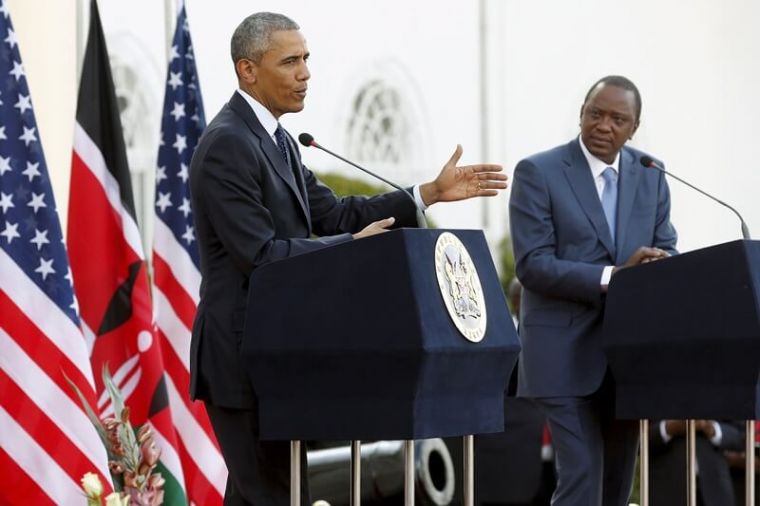President Obama ignores African warnings, champions cause of gays in visit to Kenya

Dismissing warnings by African political and religious leaders, US President Barack Obama pushed through with his agenda and championed the cause of gays in Kenya as he returned to his father's homeland Friday for the first time.
He lectured Kenyan President Uhuru Kenyatta about Kenya's gay rights record, criticising Kenya for considering sexual activity between two men illegal and punishable by up to 14 years of imprisonment.
"When you start treating people differently not because of any harm they are doing to anybody, but because they are different, that's the path whereby freedoms begin to erode," Obama said at a joint press conference with the Kenyan leader in Nairobi. "And bad things happen."
He also equated legalised discrimination of gays to racism in the US, CNN wrote.
"And when a government gets in a habit of people treating people differently, those habits can spread," Obama said. "As an African-American, I am painfully aware of what happens when people are treated differently under the law."
Kenyatta stood his ground and said that while the US and Kenya have common values, the issue of gay rights is not one of them.
"The fact of the matter is Kenya and the US share so many values: common love for democracy, entrepreneurship, value for families—these are some things that we share," Kenyatta said. "But there are some things that we must admit we don't share. Our culture, our societies don't accept."
"It is very difficult for us to be able to impose on people that which they themselves do not accept," he went on. "This is why I repeatedly say for Kenyans today the (gay rights issue) is generally a non-issue. We want to focus on other areas."
In his previous trips in the region, Obama asked governments to respect gay rights as homosexuality remains illegal in Kenya and in 36 other African countries.
He insisted on having gay rights as part of his agenda during his trip to the continent, as LGBT groups urge him to push for the issue in the region, CBN News wrote.
Kenya's leaders in both the political and religious spheres had cautioned the US president in a letter that any introduction to gay rights would not be warmly received in the African country.
"We do not want him to come and talk on homosexuality in Kenya or push us to accepting that which is against our faith and culture," said Mark Kariuki, the brains behind such an open letter.
"Let him talk about development; let him talk about cooperation; let him talk about the long-time relationship Kenya has had with America. But about our beliefs and culture—keep off!" said Kariuki, who heads an alliance of 38,000 churches and 10 million Christians in Kenya.
"The family is the strength of a nation. If the family is destroyed, then the nation is destroyed," Kariuki said. "So we don't want to open doors for our nation to be destroyed!"
Obama fulfilled the hopes of many Kenyans as he returned to the African country, which sees him as a local son, said Fox News.
"I don't think that Kenyans think of Obama as African-American. They think of him as Kenyan-American," said EJ Hogendoorn, deputy program director for Africa at the International Crisis Group.
Obama spent the evening with his family, including his step-grandmother who had to travel to the capital of Nairobi from her rural village.
The president has been quoted as saying that he felt "the weight of that absence" of his Kenyan-born father, who was not there as he grew up.
Barack Obama, Sr., his father, left Kenya to study at the University of Hawaii where he met Stanley Ann Dunham, a white woman from Kansas who would become his mother.











